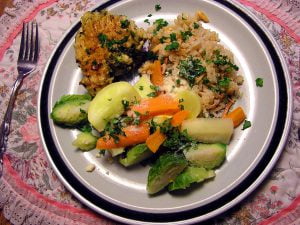
Now, since you know why herbs and spices deserve some recognition in the health department, here is a list of the most commonly used herbs and spices in preparing all those sumptuous and nutritious Mediterranean dishes. I know you are looking forward to getting to know them all!
Garlic
Garlic is considered to be one of “Nature’s Superfoods” – and rightfully so! This “stinking rose” can do a lot than just provide a great flavour to your Mediterranean dishes. It can also help you manage your blood pressure levels, keep your heart in the pink of health and protect you against certain forms of cancer. Aside from these, garlic is also known to have some very powerful antibacterial, antiviral and anti-inflammatory properties and these can help you ward off a lot of diseases. Quite impressive, don’t you think so?
Garlic is used in a lot of Mediterranean recipes. When added to sauces (consider French aioli and Greek skordalia), salads and mayonnaise, garlic imparts a fierce and powerful flavor favoured by those who love Mediterranean cookery. However, when used in dishes that require long, slow cooking, garlic lends a characteristically smooth and gentle flavor. You simply have to love this!
Basil
Among the range of Mediterranean herbs and spices basil is yet another staple ingredient in Mediterranean cooking. Its sweet flavor goes well with tomatoes, peppers and cheese and is therefore ideal for use in green salads and other savoury dishes.
Like garlic, basil offers a lot of health benefits. It contains significant amounts of flavonoids (nutrients that help promote cardiovascular health) and some highly beneficial essential oils. Studies indicate that the volatile oils found in basil have excellent antibacterial and anti-inflammatory properties as well.
In fact, according to a study published in the July 2003 issue of the Journal of Microbiology Methods, the essential oils found in basil were proven to be very effective in countering the effects of some common widespread bacterial strains (Enterococcus, Pseudomonas and Staphylococcus).
Additionally, a report published in the February 2004 issue of the journal Food Microbiology proved that washing agricultural produce in a 1% basil or thyme essential oil solution can significantly reduce the population of the Shigella bacteria – a bacterial strain that can cause diarrhea and significant intestinal damage.
Basil also contains significant amounts of magnesium, iron, calcium, potassium and vitamin C. Now, perhaps you see why you need to start adding basil to your dishes, right?
Paprika
Being the most famous of all spices used in Mediterranean cooking, paprika is used in many traditional Spanish dishes such as paella and the traditional chorizo. Since this extremely popular Mediterranean spice is made by grinding dried bell or chili peppers, its flavor can range from mild and sweet to moderately spicy and fiery hot. Nutritionally speaking, paprika is a rich source of vitamin C and antioxidants.
Parsley
This simply has to be one of the most important herbs in Italian cuisine. Parsley is often used to set off the strong flavor of red meats so you’ll often see it in their lasagna and other meat sauces as well as in their stews and potato dishes. Parsley is also widely used in preparing omelettes, legumes and fish dishes. In short, it goes in almost anything – except sweets! However, it is interesting to note that Italians prefer to use the flat-leaved variety for they believe that it gives off a more authentic Mediterranean flavor as compared to the curly-leaved variety.
So, is parsley good for your health? Well, you bet it is! Studies prove that aside from containing significant amounts of phytochemicals, it also contains apigenine, another chemical that has the ability to ward off cancer. Parsley is likewise an excellent diuretic agent and has some very powerful antimicrobial properties as well.
And there you have it – some of the most common herbs and spices used in Mediterranean cuisine and the health benefits you can get from them. There are still a lot of notable herbs and spices and we’ll be discussing them one by one. That’s a promise!
Have you learned something useful today? I hope you did!
Here’s to a healthy future,
Ray Baker


